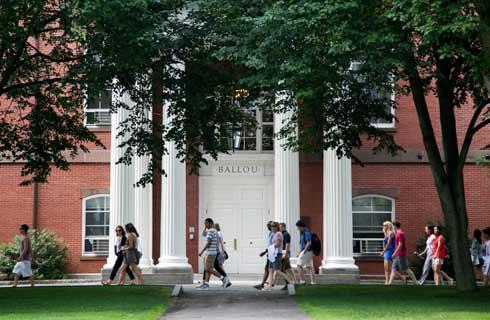环境教育学硕士
Master of Education in Environmental Education


学历文凭
Masters Degree

专业院系

开学时间

课程时长

课程学费

国际学生入学条件
A four-year baccalaureate degree from a U.S. college or university that was regionally accredited at the time the degree was conferred, or an equivalent baccalaureate degree from a foreign university, the degree must be appropriate to the master's study intended. Unofficial transcripts from every higher education institution attended for academic credit are required with the application. These transcripts will be used for GPA calculation and evaluation purposes. Official transcripts will be required of candidates upon acceptance of an offer of admission.
A 3.0 grade point average (on a 4.0 scale) over all post-secondary coursework. Applicants with advanced degrees from accredited institutions are generally, at the discretion of the Graduate School, considered to have met GPA requirements.
Three current letters of recommendation from professors in the applicant's undergraduate major field, or from professors of post-baccalaureate courses, or from others able to make an appropriate assessment of the applicant's academic or professional competence. The MBA and MPAcc programs require a resume in lieu of references.
All applicants should have experience in the field of environmental education and a basic background in natural history. Each applicant's background will be examined to determine if additional preparation is needed.
IDP—雅思考试联合主办方

雅思考试总分
7.0
- 雅思总分:7
- 托福网考总分:86
- 托福笔试总分:160
- 其他语言考试:NA
CRICOS代码:
申请截止日期: 请与IDP联系 以获取详细信息。
课程简介
The philosophy of environmental education at College of the Environment is that it is to be broad and inclusive. The goal of environmental education, in the words of the 1976 Belgrade Charter that saw the international spread of the profession, is to develop a world population that is aware of, and concerned about, the environment and its associated problems, and which has the knowledge, skills, attitudes, motivations, and commitment to work individually and collectively toward solutions of current problems and the prevention of new ones. Since then, environmental education has diversified greatly, and now takes place in formal classrooms, school grounds, nature centers, outdoor and environmental education programs, government agency programs, mass- and social-media venues, and community-based programs in businesses, faith communities, international conservation, and environmental-social justice movements.<br><br>At the College of the Environment, our environmental education programs focus on the human relationship to nature, with special emphasis on the intrinsic development of the learner in his or her own culture. Currently, we offer several options for educators seeking an M.Ed. in environmental education.
相关申请
 预科
预科 奖学金
奖学金 实习机会
实习机会 在校学习
在校学习 跨境学习
跨境学习 校园授课-线上开始
校园授课-线上开始 在线/远程学习
在线/远程学习
开学时间&学费
学费信息仅供参考,请与IDP联系以获取详细信息
| 开学时间 | 时长 | 学费 | 地点 |
|---|
本校相关课程

International Year
学历文凭
Foundation for Undergraduate
开学日期
课程费用总额


International Year
学历文凭
Foundation for Undergraduate
开学日期
课程费用总额


International Year
学历文凭
Foundation for Undergraduate
开学日期
课程费用总额


工商管理硕士(白天)
学历文凭
Masters Degree
开学日期
课程费用总额


会计文学学士学位
学历文凭
Bachelor Degree
开学日期
课程费用总额


美国文化研究文学学士学位
学历文凭
Bachelor Degree
开学日期
课程费用总额

其他相关课程

理学学士(生物多样性和保护)
 弗林德斯大学
弗林德斯大学泰晤士高等教育世界大学排名:307
学历文凭
Bachelor Degree
开学日期
课程费用总额


理学学士-生物多样性和保护(荣誉)
 弗林德斯大学
弗林德斯大学泰晤士高等教育世界大学排名:307
学历文凭
Bachelor Degree with Honours
开学日期
课程费用总额


保护与土地管理文凭
 查尔斯·达尔文大学
查尔斯·达尔文大学泰晤士高等教育世界大学排名:417
学历文凭
Diploma
开学日期
课程费用总额


哲学博士(环境与农业)
 科廷大学
科廷大学泰晤士高等教育世界大学排名:256
学历文凭
Ph.D.
开学日期
课程费用总额


环境政策与管理研究生证书
 阿德莱德大学
阿德莱德大学学历文凭
Graduate Certificate
开学日期
课程费用总额


环境政策与管理研究生文凭
 阿德莱德大学
阿德莱德大学学历文凭
Graduate Diploma
开学日期
课程费用总额









 美国
美国
